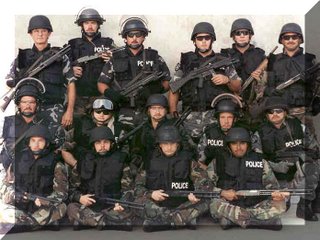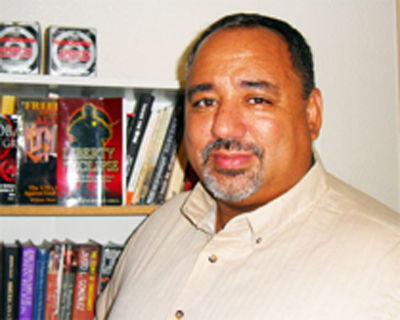Support Your Paramilitary Police?

THESE are the “good guys.”
“I am so sorry to see that you, who worked for a group that supports local police, have nothing but contempt for police,” a decent and conscientious police officer wrote in a recent e-mail. “You and [Reason Senior Editor and libertarian blogger Radley] Balko can point out mistakes here and there, and some very serious I agree. There many search warrants done each day across this country and most are successful and without incident. I don’t see you commenting on them or I don’t see you mentioning cops that get shot during these warrants.”
“I don’t see you writing about cops like myself who after executing search warrants and yanking perps out in cuffs were approached by old ladies and and moms with kids thanking me for giving them freedom and liberty to move about their own property and streets,” continued the officer, who serves in Queens, New York. “I am an old right conservative and supporter of the free market. I am not a statist. Many more are getting shot by perps and not by police. I do believe though that most major cities are going to hire more and more bad guys because of the PC mentality.”
While I have no reason to think that this fellow is anything other than an earnest and capable public servant – in the honorable sense of that expression – it was his misfortune to write that letter on the same day that 23-year-old Sean Bell was killed by a 50-shot fusillade from plainclothes NYPD officers in the same borough.
The undercover police had staked out a strip club in the Jamaica section of Queens. Mr. Bell and his two companions (the latter were wounded in the assault) were at the club for a bachelor party. The incident took place in the early morning hours of what was supposed to be Bell’s wedding day, a tardy but welcome development in light of the fact that he and his live-in girlfriend already had two young children.
Early reports of the shooting claimed that the officers believed that either Bell or one of his companions was armed, and that the driver of the car they were riding deliberately struck one of the officers after he had identified himself. After the shooting – during which stray bullets perforated some nearby apartment buildings – the officers called for backup. A search of the car and its occupants failed to find a gun.
Speaking the day after Bell was killed, New York Police Commissioner Raymond Kelly acknowledged (as paraphrased by the AP) that it was “unclear what prompted police to open fire,” and that it “was also not clear whether the shooters had identified themselves as police.”
One analyst describes episodes of this sort, in which several police empty their clips into unarmed suspects, as “contagious shooting,” “gunfire that spreads among officers who believe that they, or their colleagues, are facing a threat,” in the words of the New York Times. “It spreads like germs, or laughter, or fear. An officer fires, so his colleagues do, too.”
This type of behavior is predictable for Marines patrolling one of Baghdad’s more turbulent neighborhoods. One would expect that a different mind-set would prevail for civilian police in American neighborhoods.
One would expect this. One would be wrong.
“Simply put, the police culture in our country has changed,” reports Joseph D. McNamara, a former police chief in Kansas City, Missouri and San Jose, in an op-ed published in today’s Wall Street Journal (November 29; subscription only). “An emphasis on `officer safety’ and paramilitary training pervades today’s policing, in contrast to the older culture, which held that cops didn’t shoot until they were about to shoot or be stabbed. Police in large cities formerly carried revolvers holding six .38-caliber rounds. Nowadays, police carry semi-automatic pistols with 16 high-caliber rounds, shotguns and military assault rifles, weapons once relegated to SWAT teams facing extraordinary circumstances. Concern about such firepower in densely populated areas hitting innocent citizens has given way to an attitude that police are fighting a war against drugs and crime and must be heavily armed.”
While police work is dangerous, and some police officers die heroically in defense of the innocent (may God grant rest to their souls and comfort to their families), the on-duty mortality rate of police officers is incredibly low. McNamara points out that last year, 51 officers were killed in the line of duty “out of some 700,000 to 800,000 American cops. That is far fewer than the police fatalities occurring when I patrolled New York’s highest crime precincts.”
Here’s a question somebody needs to examine: How many innocent civilians were killed by police last year, in paramilitary raids and other unnecessary shootings? I would wager that the civilian casualty count is higher than 51.
The “officer safety” mindset has dangerous and lamentable consequences beyond militaristic overkill, among them a tendency to immunize police against civil and criminal liability – or even significant career injury – when they kill innocent people.
Witness the case of Salvatore Culosi, a 37-year-old optometrist who was killed by Fairfax, Virginia SWAT operators last January. Culosi was suspected of operating an illegal sports betting operation, which is hardly the type of supposed offense that would justify sending a SWAT team to execute an arrest warrant. (Virginia has a state lottery, so laws against sports betting really make no sense.)
Although Culosi was unarmed and offered no resistance, he was shot dead during the January 24 encounter.
Just days ago, an official inquiry ruled out criminal charges against the man who killed Culosi, 17-year police veteran Deval Bullock. However, Bullock faces a three-week suspension without pay.
Astonishing as it may seem, the local police union is protesting this disciplinary sanction as excessive.
Marshall Thielen, president of the police union, called the penalty unprecedented and too harsh. “There’s never been anything close to that,” complains union president Marshall Thielen, describing Bullock’s unjustified killing of an unarmed, non-violent citizen a “tragic mistake while trying to help the community.”
Which of these individuals was a larger threat to the community: A mild-mannered optometrist who was taking bets on football games, or a heavily armed paramilitary operator who can kill people with impunity?
Questions of this sort ricochet harmlessly off a mind armored with the “officer protection” dogma.
Video Extra
Here’s a TV news account of full-force SWAT raids in Dallas against “illegal” poker games.
Here’s a fanboyish piece of self-dramatizing video from an Alabama SWAT operator that is borderline auto-erotic.
And here’s a news report from Communist China documenting how the Boyz in Beijing are gettin’ their SWAT freak on in anticipation of the 2008 Olympics.
Content retrieved from: http://freedominourtime.blogspot.com/2006/11/support-your-paramilitary-police.html.




























